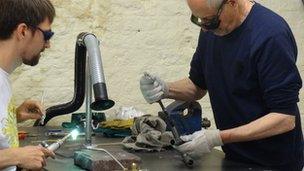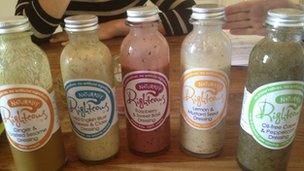Crowdfunding start-ups show how to sidestep bank loans
- Published
Founder of The Bicycle Academy Andrew Denham shares his tips for raising capital through crowdfunding.
Entrepreneurs are having a tough time at the moment, as banks are slow to loan them money but start-ups are increasingly finding funding through other means - by asking complete strangers.
There is a counter-cultural buzz in the small town of Frome in Somerset. Independent cafes and shops line the hilly cobbled streets, and rare is the window not plastered with posters advertising theatre productions or art exhibitions.
But even in this enterprising place, it is somewhat surprising to find evidence of an increasingly powerful new business idea.
In a small workshop just outside the town centre is the Bicycle Academy. It's a new business dreamt up by Andrew Denham, who wanted to run bike-building courses that were within the budget of the average cycling fanatic.
He also wanted to incorporate a social enterprise element - the first frame made by every student would be donated to a charity in Africa.

Investors in the Bicycle Academy are taught how to make their own bike in return
But there was a rather significant problem. He did not have enough money for the premises or the equipment needed to start the business.
In the recent past, budding entrepreneurs might have dropped into one of Frome's banks or even maxed out their credit cards to raise funds, but Mr Denham decided to try crowdfunding instead.
Last November, he put his business proposal on a website and asked the general public - total strangers - for money.
"We had six weeks within which we needed to raise £40,000 ($63,000) - we actually raised all of the money within six days," he told Radio 4's In Business.
Donors to the Bicycle Academy received a T-shirt if they pledged £20, and other rewards, such as bags and model bikes, for higher amounts.
A donation of £300 secured a place on a one-day bike building workshop. Donors of £500 or more were able to reserve the first places on the academy's four-day course.
Chris Vernon was one of the big donors who started building steel-framed bikes at the workshop last month.
"I was one of the early backers, just because I had the money there and I thought this would be a useful project to engage with at the earliest stage," he says.
"But also I really wanted to see it happen, so I was very keen to put my money in and encourage others to do so."
Crowdfunding expands
Crowdfunding was originally conceived as a way to fund mostly unprofitable creative projects such as films, band tours and album recordings. US websites Kickstarter and Indiegogo have raised millions of dollars for artists of all stripes.
In the UK, money for start-ups is tight - Bank of England figures indicate that lending to businesses has been shrinking since the end of 2008 - and crowdfunding is now spreading beyond the arts.
Crowdfunding itself is also evolving. Instead of soliciting donations to get his business off the ground, Oliver Morgan sold a share of his already established company to the crowd when he needed to expand.
A serial entrepreneur at just 20 years old, Mr Morgan spotted a business opportunity delivering fuel oil, taking on established regional distributors.
"There's always room for a little guy, and something that's controlled by a big few is usually where the opportunities are," he says.
His company, Universal Fuels, got some bank financing, but soon came up against the limit of its £20,000 overdraft.
"We were looking at taking on investment from a venture capitalist, but you hear a lot of stories about how your business gets taken over," he says.
Two rounds of crowdfunding raised £150,000 for the company, including one big investment of £100,000. In return, Mr Morgan gave up just 24% of his growing business - a much lower share, he says, than what venture capitalists were asking for.
Universal Fuels raised its money by posting on the website Crowdcube. The site's co-founder, Darren Westlake, says his inspiration came from his own frustrating experiences trying to fund start-up businesses.
"I really thought there must be another way that people can raise finance," he says.
A risky deal?
Exeter-based Crowdcube sees its mission as opening up small-scale investment to the masses - the minimum investment on the site is just £10 and the company allows start-ups to sell shares.

East London's tech hub, so-called Silicon Roundabout, is home to new crowdfunding firms
Crowdcube has other UK-based challengers, too, including the start-up site Seedrs, based near the growing Silicon Roundabout tech corridor in East London.
Seedrs launched in July of this year, but already four businesses have successfully hit funding targets on the site.
"Britain has the potential to build some of the greatest businesses in the world over the next 10 to 20 years," says Seedrs co-founder Jeff Lynn.
When it comes to equity crowdfunding, the UK is leading the way.
US lawmakers passed the Jobs Act (Jumpstart Our Business Start-ups) earlier this year, which included a provision legalising selling shares on crowdfunding sites, but authorities are still deciding how the act will be implemented.
Despite early successes, critics charge that crowdfunding is too risky and that most businesses funded in this way are destined to fail.
The Financial Services Authority recently published guidance on crowdfunding investment, external warning investors that many crowdfunding opportunities are high risk and complex, and are suited to sophisticated investors only.
Daniel Isenberg, an entrepreneur and professor at Babson College in Massachusetts, sees virtue in donation-based crowdfunding, but not in the share-selling model.
"When it comes to equity markets, crowds are notoriously not smart - they're not wise," he says.
"The only way you can make money buying an equity is by buying low and selling high. You have to go against the market in order to make money," Mr Isenberg warns.
"The smart investors are the ones staying out of equity crowdfunding, so who's left?"
Enabling company growth
But equity crowdfunding supporters are quick to point out the differences between small seed investments and playing the stock markets.

A diverse range of businesses are now using crowdfunding - including Righteous salad dressings
"I agree that crowds do tend to jump - and actually that doesn't happen here," says Mr Lynn of Seedrs.
"This is a one-time decision… and I think that the crowds will do an excellent job in making that kind of decision."
As the idea has caught on, even entrepreneurs with a solid track record have been turning to the crowd to raise funds.
Gem Misa is a former marketing executive for global giant Unilever, but when selling washing powder got boring, she poured her passion into Righteous - an all-natural salad dressing business.
She was successful in developing recipes and signing deals with big retailers, but she soon realised that she needed to change strategy.
"When Righteous ended up on supermarket shelves, we couldn't do slow organic growth anymore. We needed to tell more people about the product," she says.
"I realised we needed a big advertising campaign and there was no way I was going to be able to fund that myself."
A crowd of 85 invested £75,000 to produce a slick ad shown on digital TV channels. The campaign aired over the summer, along with a supermarket trial, and sales went up 300%.
The nascent crowdfunding industry in the UK has also been helped by government tax breaks designed to boost investment in small enterprises.
Under this year's Seed Enterprise Investment Scheme, external tax break, investors can get tax relief of 50% on investments of £100,000 in start-ups. Combined with other continuing tax breaks, UK investors can save up to 78% on money they put into small companies.
Despite the huge incentives, Crowdcube's Darren Westlake brushes aside suggestions that the breaks are creating a bubble in the crowdfunding arena.
"It's designed to open people's eyes to the opportunities of investing in small companies which the man on the street may not have normally thought about," he says.
In Frome, the founder of the Bicycle Academy is convinced of crowdfunding's potential.
Not only are his courses fully booked, but there is a bulging waiting list.
"It would have been very difficult to do it without crowdfunding," Andrew Denham says.
"I know people who have tried to go the conventional route and failed - the banks have turned them down."
Plus, he says, donors to the business have been more than mere customers - a particular strength of the crowdfunding model.
"What we've created is 183 evangelists of The Bicycle Academy - they help support us, they help promote us, and that's invaluable."
Listen to the full report on In Business on BBC Radio 4 on Thursday, 23 August at 20:30 BST or Sunday, 26 August at 21:30 BST.
Listen again via the Radio 4 website or World of Business download.
- Published23 August 2012